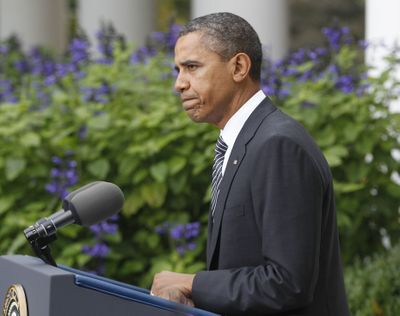Obama adeptly wields big stick

WASHINGTON – For a president who promised to end the gunslinger ways of his predecessor, Barack Obama has proven himself very comfortable with the use of lethal force.
In the past six months, he authorized Navy Seals to kill Osama bin Laden in Pakistan. He approved the fatal drone strike on an American cleric in Yemen and dispatched military advisers to Uganda to hunt down the leaders of a notorious militia. All told this year, he has sent U.S. troops into action in or over at least seven countries on two continents.
Now he has added Moammar Gadhafi to the list of enemies eliminated.
“This comes at a time when we see the strength of American leadership across the world,” Obama said from the White House Rose Garden, tabulating his achievements with language that betrayed a trace of bravado.
“We’ve taken out al-Qaida leaders, and we’ve put them on a path to defeat.”
Those foreign victories are unlikely to bring him much reward at home. With voters singularly focused on the economy, developments overseas have little influence on Obama’s approval level. The president’s “bump” in the polls after bin Laden’s death lasted barely a month. No one expects a similar boost from Gadhafi’s demise.
About the most that Obama and his strategists can hope for politically is that killing national enemies such as bin Laden and Gadhafi will help defend him against Republican charges that he is a weak, indecisive leader.
Obama’s aides have not been shy to make that point. Asked in a recent interview whether Obama had been prepared for the presidency, David Axelrod, a top campaign adviser, replied: “Maybe you should go ask Osama bin Laden if he thought he was prepared.”
In recent months, the Libyan operation, which was launched in early spring, had become almost an afterthought in Washington, where the president and his Republican opponents are locked in stalemate over the economy and the overall size of government.
While foreign military operations may not engage the public’s attention, they have become one of the administration’s clearest legacies. The administration has embraced a style of war that could be seen clearly in the commando raid on bin Laden’s compound, the Hellfire missile that killed Anwar al-Awlaki in Yemen and the airstrikes in Libya.
Obama made clear his preference for those sorts of engagements in his most prideful line Thursday: “Without putting a single U.S. service member on the ground, we achieved our objective,” he said.
That change has been partly imposed by circumstances. Obama went into the Libyan crisis determined to not stretch American military resources further, with U.S. forces committed in Iraq and Afghanistan and the domestic economy struggling. The result is a new approach to waging war.
“The contrast between Bush’s handling of Iraq and Afghanistan and Obama’s handling of Libya is breathtaking,” said Bruce Riedel, a former CIA officer and a senior fellow at the Brookings Institution. “No ground footprint, no U.S. casualties and no responsibility for the day after.”
Obama’s willingness to engage militarily has angered some of his Democratic supporters. But he was never the dove that some imagined in 2008. As a candidate, Obama argued that terror groups in Afghanistan were a more direct threat to the U.S. than were the insurgents in Iraq, and he sent an additional 13,000 troops there a month after taking office.
Late in 2009, he approved another 30,000, which increased the overall U.S. troop presence to nearly 100,000. Even when the troop surge ends after next summer, there will still be more U.S. troops in Afghanistan than when Obama took office.
But by contrast with George W. Bush, he has tried to avoid at least the appearance of America acting as a solo sheriff. In his remarks after Gadhafi’s death, he linked the end of the Libyan regime to that broader foreign policy theme as he stressed that the U.S. had acted as part of a “coalition that included … NATO and Arab nations.”
Libya may be back on the administration’s problem list long before the 2012 election rolls around, of course.
Gadhafi is “gone, but what will be the character of the political order that emerges in his wake?” asked Andrew Bacevich, a professor of history and international relations at Boston University. “I don’t think the U.S. will have a tremendous amount of influence in determining what the character of that order will be.”